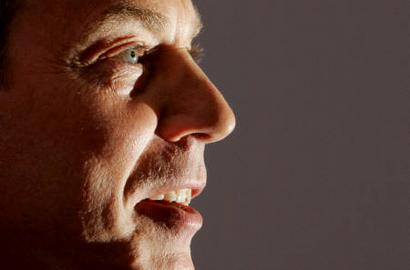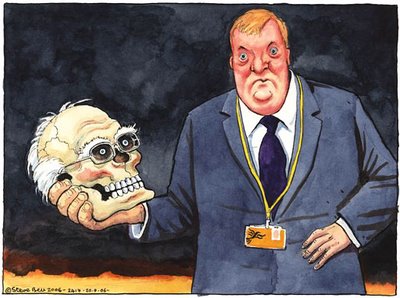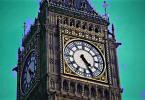 Didn't have time to watch the Labour party conference? Here is a short blagger's guide to the week in Manchester.
Didn't have time to watch the Labour party conference? Here is a short blagger's guide to the week in Manchester.The whole conference was dominated by the leadership issue. Tony was forced into admitting that this will be his last conference as party leader earlier this month. Gay MP Chris Bryant was a leading conspirator, which is odd as he is top mates with Cherie. Anyway as everyone knew it was Tony's last turn, it meant this conference was an opportunity for all those people who think they should be in charge to show off.
The week started with a very good speech by Gordon Brown, which was totally a bid for the leadership. Pretty much everyone knows that Big Gordon is going to succeed, but the talk is of a Blairite cabinet minister to challenge him. Activists want this for two reasons - some think it is vital that Labour have a proper contest and not a coronation. This also means the party gets to properly debate its future policy and direction.
Others think Gordon is a grumpy old Scottish accountant that the voters don't like. Anyway. Good speech by Gordon. Immediately over-shadowed by the story that Cherie had an outburst during the speech calling Gordon a liar.
To make matters worse, Peter Mandelson, the Merlin to Blair's King Arthur, vomited all over Gordon as well by saying that he is, well, a bit grumpy and Scottish and the voters won't love him like they love Tony.
Then, to make matters even worse, Tony got up and made just about the best speech of his life, saying all sorts of odd things like "I love this party" and getting everyone all emotional. Tessa Jowell, proving what a total poppet she is, brought a box of Kleenex in with her and the whole box got used. It was that good.
Tony spoke about his two quite-dishy sons, Euan and Nicholas, and the boys got lots of close-ups, so we can expect to see one or both of them turn up on reality TV very soon. And possibly in parliament.
So everyone said 'Isn't Tony wonderful?' and then Bill Clinton turned up. Bill said Tony was like the best PM ever and that Labour should be thanking God for letting him be their leader.
Then Bill said that Gordon was stunning, well his vision for Britain is at any rate. Then Bill like totally flirted with the whole conference at once and they LOVED IT! He charmed the pants off the entire room, and luckily everyone forgot about how great Tony's speech was AND how great Gordon's speech was.
Bob Geldof turned up but stupidly forgot to bring teen-of-the-moment, his daughter Peaches. So Bob on his own really was no match for Bill Clinton and no-one paid much attention to the Irish moaner.
Anyway, so basically every cabinet minister, apart from John 'taxi for Prescott' Prescott, got a chance to show off how totally wonderful they are and hopefully put them in the running for the job of leader or deputy.
Early money was on Alan Johnson, the urbane former postman and now education secretary, as the stop Gordon! candidate. But his speech was a bit rubbish.
John Reid, the man who plays the role of Home Secretary as if he has confused it with a gangster off Taggart, made a much better speech. So now everyone is talking about him as the stop Gordon! candidate. He might do ok.
The thing to remember is no-one can beat Gordon. The leader of the Labour party is elected by an electoral college with three constituent parts. The unions, the MPs and MEPs and the Constituency Labour Parties all have an equal vote. Millions of people will take part in the election. They are all going to vote for Gordon. The unions aren't going to vote for a Blairite candidate. They want Gordon. The Constituency Labour Parties want Gordon.
So all this smart talk about stopping Gordon is all just nonsense. All they will achieve is to weaken him, he will be walking into Downing St no matter what they say or do.
Even though Tony Blair refuses to say who he will back, and might be a total total bastard and back someone else against Gordon, the Chancellor will still win. Anytime anyone tries to tell you different, show off about how you know all about the electoral college system. Then call them thick.
In the conference week Foreign Secretary Margaret Beckett, Deputy PM John Prescott and future leader and Blair pin-up boy David Miliband all said publicly that they are backing Gordon.
At the end of the conference, John Prescott made his traditional shouting speech to conference. This year he started by saying sorry for letting the party and himself down. He did not apologise for banging his diary secretary. Or even for getting caught. Or for cheating on his scary-looking wife. But for causing embarassment to the Labour party.
Anyway he had a good shout about the Tories and everyone went home happy. The latest talk is about who will take his job when Blair goes. The field has been narrowed down to everyone in the cabinet. And now a left-wing backbench MP has announced he will run.
If you are planning to bet, put your money on Harriet Harman or Jack Straw.
Oh and at the very very end of conference, they sang The Red Flag and Jerusalem and Cherie belted them out like a secretary in a karaoke winebar with ten Baileys inside her! Well done! No matter who leads the Labour party next, I doubt we will get as much entertainment or value for money as we get from Cherie.




















